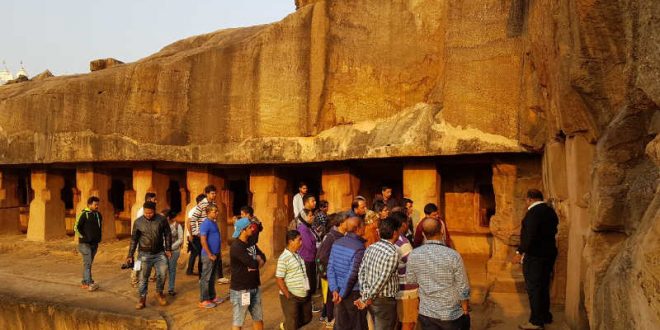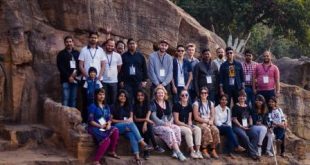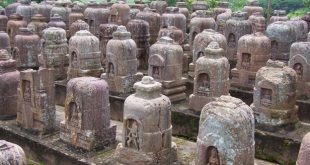Bhubaneswar: If you think, the tales of Twin Hills of Udayagiri-Khandagiri is only relating to Jain religious shrines, then you might be missing many things.
The rock art inside the Elephant Caves (Hati Gumpha) discovered by Prof. Sadashiba Pradhan during an expedition in 2008 threw a new light on the ancientness of the place and it could be nearly 5,000 to 10,000 years old and might be used as caves by people from the ancient world.
Tour guide Manoj Bhoi, a student of History, himself in the past, while explaining the interesting stories behind the Udayagiri-Khandagiri Twin Hills said “the rock art discovery by Prof Sadashiba Pradhan has proved that there were human beings inside the caves and the rock art is speaking about the activities of the users and the sociological circumstances.’’
Saying that apart from the rock-art the Hati Gumpha is also having a beautiful inscription, Manoj added that the city has recently added the existence of fine rock art samples at Chandaka-Dampara Wildlife Sanctuary and the site is under the protection of both Forest Department and Archaeological Survey of India. Hati Gumpha is perhaps the only natural cave in the Twin Hills of Udayagiri and Khandagiri, whereas all others were created by human beings.
The 35 visitors, part of the walk today, toured Rani Gumpha, often claimed by historians as a community performance hall, which for the first time has a cultural show. The 2nd Century engraving also depicted with elements of modern social thoughts. The guide also said that the damsels dancing before their male counterparts are nowhere found depicted in any monument across India.
Later while speaking about the Lalatendukeshari Gumpha behind the Barabhuja Caves and shrines in Khandagiri hills, walkers were surprised to see the roc-cut, life-size relief images above the hill making a very good sight.
“The Udayagiri-Khandagiri caves are 1,200 years older than the caves seen in Ellora but the cave-like Hati Gumpha is much older, making the Twin Hills an important sculptural splendour for our City,’’ explained the guide.
Prof. Chitta Baral from Arizona State University in the US, who was part of the second “Monks, Caves and Kings”, today, said, “I am happy to see the second heritage walk of the city within almost a year’s time and the regularity is a thing to be congratulated. We must have more such walks to engage the visitors, both domestic and foreign. We can also plan tours for sites within 20 km radius of the city.’’
It can be mentioned here that all heritage walks will be part of the Ekamra Walks, but as the first one is now referred as Old City or Lingaraj Circuit, the second one is called ‘Monks, Caves and Kings’.
The Old Town heritage walk starts from Mukteswar Temple and ends at Ekamra Van, the medicinal plant garden on Sunday and on Saturday the heritage walk at the Twin Hills starts from Udayagiri and ends at the Lalatendukeshari Caves in Khandagiri.
 Update Odisha-Latest Odisha News I Breaking News Get latest news on Odisha, Govt. Jobs, OSSC, OPSC, Entertainment, Crime, Sports, and Education
Update Odisha-Latest Odisha News I Breaking News Get latest news on Odisha, Govt. Jobs, OSSC, OPSC, Entertainment, Crime, Sports, and Education



